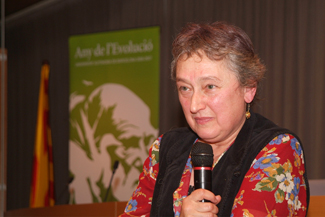Lynn Margulis, a microbiologist at the U.S. considered one of the leading figures in the evolution theory

Lynn Margulis gained her Ph.D. with the Department of Genetics at the University of California, Berkeley (1960-1963). Currently, she is University Professor in the Department of Geosciences at the University of Massachusetts Amherst. Her outstanding career has brought her honours from the National Academy of Sciences and from the Russian Academy of Natural Sciences (1997). She also received the US National Medal of Science (the President William Clinton Presidential Medal of Science) in 1999, and the Alexander von Humboldt Prize (2002-2005).
- In your opinion what is the origin of Life?
- Nobody really knows. We can imagine, we can talk about it, we can write books, but nobody knows exactly. Some think it's like a cake recipe, but that view is completely incorrect. You cannot join and mix proteins, amino acids and all the components of DNA to get a dog or a bacterium, that's impossible. I think what is more correct is to consider life as a flow of material and energy rather than a simple mixture of compounds. I think the simplest thing is to call it the process of life.
- And how did this change of rocks, minerals and water into this process called life come about?
- Because from the beginning nothing has changed. Let me explain. The chemistry of life, which is to be found in plants, animals, bacteria, etc. has remained unaltered since the beginning. This is a chemistry of transduction, which means that a change from one form of energy into another has taken place, and this process remains the same. Therefore, I think we have to consider life as a growth process that is always being transformed, with chemical energy or the energy of light, but always in a process of transformation. It is impossible for this process to take place with a dead mixture. For example, if you observe a bull before it dies and then just after, you will see that its composition has not changed, it has cells, DNA, RNA, the lot, but it is dead. This means that you can have the components without obtaining the phenomena.
- You say there are two types of life: bacteria and communities of bacteria. Can you explain this difference?
- All life is bacteria and bacteria are units, living beings, living units. Everything else, which we see as animals or plants, are living beings made up of more than one type of bacteria. That is they are the result of a symbiogenesis between more than one type of bacteria.
- Symbiogenesis, an evolutionary mechanism?
- As Myers said, to do anything in science you have to study it in depth. But to study evolution you need to do more than that. That is because evolution is something very complex, here we cannot say one thing is more important than another. It is like a cell, we cannot say that the membrane is more important than the nucleus, because without one of these the system would not exist. In this way, natural selection has a relevant weight in evolution. Nevertheless, when I have asked for a palpable example of accumulation by chance nobody has given me an answer. There is no literature of this nature, there is a lot of theoretical literature, but that has nothing to do with the biology that I know. I have seen many examples where we can clearly see the process of symbiogenesis and that is what I study.
- That means you do not think that chance plays a role in evolution...
- I do not consider that chance intervenes in evolution, which does not mean that I agree with creationists or anything like that. However, many evolutionists have not been very happy with my proposals. That is a shame because, in fact, to carry out science you have to be critical, and not rely on dogmas.
- Speaking of dogmas, what do you think about those who talk about Intelligent Design?
- They are ignorant. More precisely, they are dogmatic and should admit that they are a religious group. I have nothing against religion, I respect it. I think they should talk about their religious beliefs in religion class, but not in science class. Scientists try to argue based on evidence from experiments and results, not by trickery, and these people are either con men or naive, but definitely ignorant.
- You say that the death of species is programmed into sex. What do you mean by that?
- The biological definition of sex is very simple. It is the production of a new organism which has genes from more than one living organism, which means that the mixture of genes from two individuals are joined in a descendent. But we have to understand that reproduction and sexuality are two completely different concepts. For example, we have seen that bacteria begin as two organisms; they join, combine their genes and end up as one single organism. They began as two organisms and ended up as fewer than one. They did not need sexuality, just like 51% of plants and all protozoons. This is not the case with mammals, where sexuality is necessary for reproduction. For its part, sexuality is a recombining of genomes which are related to each other. However, in this process there will always be genes which are left over. This is why, to avoid cellular overproduction, there is what is called "programmed cellular death". That is why I say sex is linked to death.
- You have established the biological basis of the Gaia Theory. What is that about?
- My work has been to determine the role of microorganisms in the regulation of the atmospheric characteristics of the Earth, mainly in terms of biogeochemical cycles. I could say that this idea has its roots in the work of an early 20th century Russian scientist called Vladimir Vernadsky. In his research he reached the conclusion that the most powerful force in geology was life, not as an agent of geological change, but life as a phenomenon. All of this he summarised in his book entitled: "Biosphere".
- What else does Vernadsky say regarding the Gaia Theory?
- Vernadsky realises the importance of life as a geological force. He points out that gravity accelerates things towards the centre of the Earth, but life as a phenomenon, moves things horizontally, for example birds, spores, etc. He also realises that if any living being was to become independent from the biosphere it would die. That is he emphasises the importance of the interaction of organisms so that life can exist. Later, Lovelock said the same but in a different way. He says the earth as a planet has a physiology which is auto regulating: it maintains its temperature and composition thanks to all organisms and especially thanks to microorganisms. This means that the metabolism of bacteria is much greater chemically, which allows them to do things (that other animals and plants cannot do) and in this way to regulate the atmospheric conditions of the earth.
- And you yourself, why did you decide to become a scientist?
- I cannot imagine myself doing anything else. Since I was a child I always wanted to be an explorer and write, but I did not know what to explore. But now I find myself exploring the world of bacteria and writing about that.
Pablo Gallegos Riera
Communication Department
Pablo.Gallegos@uab.cat


